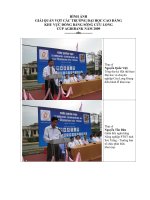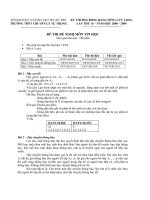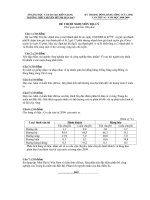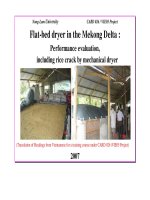KỲ THI HSG ĐỒNG BẰNG SÔNG CỬU LONG THÁNG 01 NĂM 2011 ĐƠN VỊ RA ĐỀ: SÓC TRĂNG pot
Bạn đang xem bản rút gọn của tài liệu. Xem và tải ngay bản đầy đủ của tài liệu tại đây (64.3 KB, 4 trang )
Page 1
KỲ THI HSG ĐỒNG BẰNG SÔNG CỬU LONG
THÁNG 01 NĂM 2011
ĐƠN VỊ RA ĐỀ: SÓC TRĂNG
ooOoo
ĐÁP ÁN ĐỀ NGHỊ
Môn: Tiếng Anh
I. LISTENING (3 points)
PART 1: [1.2 points]
1-C 2.A 3.D 4.B 5.A 6.C
PART 2: [1.8 points]
(1) Friday (2) History (3) Biology
(4) fifty-seven (5) forty-three (6) Tuesday
(7) Wednesday (8) Why study history? (9) Animal language
II. LEXICAL – GRAMMAR (7 points)
PART 1: MCQ [1.5 points]
1.C 2.A 3.B 4.D 5.B 6.D 7.A 8.C
9.C 10.B 11.D 12.A 13.D 14.C 15.B
PART 2: Error correction [1.0 point]
1. while – when 2. it – there 3. anyone – someone
4. because – although 5. like – as 6. if – though / although
7. a soup – the soup 8. at – in 9. within – in
10. told – said
PART 3: Word formation [1.0 point]
1. invariably 2. pressure 3. excessive 4. essential
5. retailers 6. centrally 7. illogical 8. unavoidable
9. criticism(s) 10. efficiency
PART 4: Verb forms [1.5 points]
1. has disappeared 2. failed 3. lives 4. had made
5. were walking 6. leave 7. has seen 8. hadn’t arrived
9.had 10. had been waiting 11. have been trying
10. (or) were waiting 11. (or) have tried
12. have had 13. are taking 14. believe 15. want
PART 5: Prepositions [1 point]
1. on 2. between 3. in 4. along
5. through 6. at 7. past 8. from
9. to 10. with
PART 6: Articles [1 point]
1. a 2. a 3. the 4. a 5. the
6. the 7. the 8. the 9. the 10. an
Page 2
III. READING (4 points)
PART 1: Cloze reading (MCQ) [1.5 points]
1. C. attend 2. D. obtaining 3. B. means 4. A. fit
5. B. satisfaction 6. C. set 7. A. expected 8. D. early
9. D. aim 10. A. rely 11. B. provided 12. A. addition
13. B. struggle 14.C. meet 15. C. up
PART 2: Questions – Answers (MCQ) [1 point]
1.C 2.A 3.C 4.B 5.A
6.B 7.D 8.B 9.A 10.D
PART 3: Cloze reading (open) [1.5 points]
(0) one (1) are (2) error (3) adults / people
(4) after (5) teaching (6) ride (7) road
(8) three / some (9) include (10) always (11) reduce
(12) helmets (13) for (14) the (15) them
IV. WRITING (6 points)
PART 1: Sentence transformation (0.5 point)
1. Scarcely had they come out of the building when the alarm went off.
2. Simon kept talking although / though I told him to stop.
3. To avoid missing the bus, they got to the bus station very early.
4. The more effective management is, the better working relations are / will be.
5. Your house could have been broken into when you left the door unlocked.
PART 2: Key word transformation (0.5 point)
1. After six-year relationship, Martha and Billy have decided to tie the knot.
2. At this very moment my wife is probably arriving back home.
3. I find it impossible to put up with noise.
Noise is something that is impossible for me to put up with.
4. It sounds like / as if there is something wrong with the car.
5. Someone has run off with our luggage!
PART 3: Chart interpretation (2 points)
1.Form: [0.5 point]
- The report should have a brief introduction, a body and a short conclusion.
- Good writing pieces are expected to be error-free.
2. Content: [1.5 points]
- Students know how to group the factors, for example, the irritants relating to ‘noise’ and
the irritants not relating to ‘noise’. In each group, the most irritating factor and the least irritating
factor should be mentioned and supported by the percentage from the chart.
- The description of the percentage must be as accurate as possible.
PART 4: Composition (3 points)
1.Form: [1p] + Word limit + Few mistakes + 4 to 5 short paragraphs
2. Content: [2p] + Understanding the rubric
+ Clear viewpoints (one side or the other or both)
+ Convincing supporting ideas + Good examples to illustrate each idea
Page 3
TAPESCRIPTS
PART 1: (Talk)
Thank you for coming. It’s good to see so many young entrepreneurs here. Today I’m
going to talk about how to get rich. The American writer Scott Fitzgerald once said, ‘Let me tell
you about the rich. They are very different from you and me’. He’s right. The super-rich have a
number of personal qualities that make them different. But they aren’t all good qualities. Here
are some ideas for you entrepreneurs who want to get rich.
The first thing is, be mean. You shouldn’t be too generous. John Paul Getty, one of the
richest men in history, put payphones in the bedrooms of his house so that his friends couldn’t
make free phone calls.
Number 2. You should start early. Really rich people know they want to be rich even
when they are children. Matthew Freud sold mice to his schoolfriends. He said he would be a
millionaire by the time he was twenty-five years old. He was right.
Number 3. Don’t be too extravagant. You mustn’t waste your money on stupid things.
Bill Gates doesn’t wear a suit. He doesn’t care about looking good because he doesn’t have to
look good. If you spend all your money on expensive holidays and presents, you will probably
never be rich.
Number 4. Be confident. You must believe in yourself. Everyone has great ideas but
99.9% of us never do anything about them. Anita Roddick, the boss of Body Shop, says ‘It’s all
about having a good idea and having the confidence to sell it to the public’.
Number 5. You have to work hard. Work long hours. This is the most important thing.
No one ever got rich by sleeping half the day. Rupert Murdoch goes to five o’clock meetings.
That’s 5.00 in the morning. Bernie Ecclestone, the Formula One billionaire, went to his office at
6.00 in the morning. Every day. Even when he reached the age of seventy.
Number 6. Think big. Be ambitious. You shouldn’t think about the limits of your
business. Sell yourself to the world, not only your home town. Of course there are lots of other…
PART 2: (Conversation)
JANE Hi Tim! (Tim: Jane.) How are you? (Tim: Fine.) I'd been wondering when I'd run into
you. Have you been here long?
TIM I arrived yesterday, on Sunday. How about you?
JANE I got here a few days ago, on Saturday. No - wait a minute, what's today? – Sorry,
Friday, not Saturday.
TIM But we didn't have to be here till today.
JANE Yes, I know, but I wanted to get my things moved into my room, and just take a look
around. So, did you decide to do English in the end?
TIM No, I changed my mind and opted for history instead. And you're doing biology, if
I remember correctly.
JANE Yes, although to start with I couldn't decide between that and geography.
TIM How much reading have you got? I was given an amazingly long list of books to read.
See!
JANE Wow, it does look pretty long.
TIM Well, I counted 57. I could hardly believe it! What's your list like?
JANE Well, it's not as long as yours, but it's still pretty big. There are 43. I don't know
how I'm going to get through them all.
Page 4
TIM Well you don't have to read them all this week! You just have to stay ahead of the
lectures and seminars. Have you got your class schedule yet?
JANE Yeah. It came with the reading list. When's your first lecture?
TIM Tuesday. How about you?
JANE The day after. It's my busiest day; I've got two lectures in the morning and one in
the afternoon.
JANE It's going to be different from school, isn't it!
TIM Yeah, particularly the lectures. Have you got any special strategy for listening to lectures?
JANE Well I'm going to use a cassette recorder and record them all.
TIM What! Are you allowed to?
JANE Sure. Lots of people do it nowadays. It means you can listen to the lectures all over again
later, and make really good notes.
TIM I couldn't do that. I like to take notes as I'm listening. I usually find I get all the important
points. Reading is different of course. My approach is to skim the book first to see what's
important and what isn't. It saves hours of time.
JANE But what if you miss something?
TIM You don't mean you're going to read every word, do you?
JANE Well, that's what I usually do.
TIM Well, that's up to you, but I think you're crazy!
JANE What's your first lecture on, anyway?
TIM Oh, it's a lecture on the French Revolution.
JANE The French Revolution! How boring!
TIM It's not boring at all! It was an amazing period of history. It changed everything in
Europe. So what's your first lecture about?
JANE It's about animal behaviour. It sounds really interesting.
TIM Look, I was on my way to the library. I'm going to get some of these books out and start
reading for the first essay I've got to write.
JANE And what have you got to write about?
TIM Well, you'll never believe it, I think our professor must have a sense of humour. He's
given us the title "Why study history?"
JANE That's a good one. When you find the answer, let me know!
TIM I'm going to enjoy writing it. Have you been given any writing assignments yet?
JANE Yes, I've got to write about animal language.
TIM Hmm! That sounds a challenge. I suppose you'll be off to the zoo to do field research.









